新教科版高中英语必修二学案 Unit 4 What’s in(无答案)
2019新人教高中英语选择性必修二Unit4Using Language(p42-P43)公开课教案
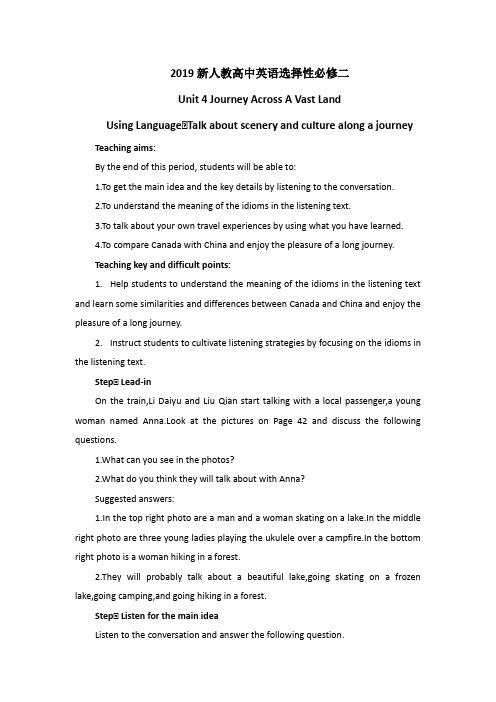
2019新人教高中英语选择性必修二Unit 4 Journey Across A Vast LandUsing LanguageⅠTalk about scenery and culture along a journey Teaching aims:By the end of this period, students will be able to:1.To get the main idea and the key details by listening to the conversation.2.To understand the meaning of the idioms in the listening text.3.To talk about your own travel experiences by using what you have learned.4.To compare Canada with China and enjoy the pleasure of a long journey.Teaching key and difficult points:1.Help students to understand the meaning of the idioms in the listening text and learn some similarities and differences between Canada and China and enjoy the pleasure of a long journey.2.Instruct students to cultivate listening strategies by focusing on the idioms in the listening text.StepⅠ Lead-inOn the train,Li Daiyu and Liu Qian start talking with a local passenger,a young woman named Anna.Look at the pictures on Page 42 and discuss the following questions.1.What can you see in the photos?2.What do you think they will talk about with Anna?Suggested answers:1.In the top right photo are a man and a woman skating on a lake.In the middle right photo are three young ladies playing the ukulele over a campfire.In the bottom right photo is a woman hiking in a forest.2.They will probably talk about a beautiful lake,going skating on a frozen lake,going camping,and going hiking in a forest.StepⅠ Listen for the main ideaListen to the conversation and answer the following question.What are mentioned in the listening? Please list some key words.Suggested answers:Lake Louise,the climate of Canada(in winter and summer),the geography of Canada (mountains,the great Canadian Prairie,lakes,forests),Winnipeg,activities in Winnipeg,Daiyu and Liu Qian’s first long train journey.StepⅠ Listen for detailsListen to the conversation again and answer the following questions.1.What do people do when Lake Louise freezes over in winter?2.What does Anna say about Canadian summers?3.What kinds of things do people do in Winnipeg?4.What other long rail journey have Li Daiyu and Liu Qian taken?5.What can you see while sitting on the train in Mongolia?Suggested answers:1.People like to go skating on the ice.2.Many areas of south Canada have very hot summers.3.Skiing,hiking,camping and city things like movies or restaurants on the weekend.4.They travelled from Beijing to Moscow on the Trans-Siberian Railway through Mongolia.5.The grasslands with rolling hills,a few small towns and a few horses or sheep.StepⅠ Listen for idiomsActivity 1 Ask the students to listen to the conversation again and fill in the blanks.Daiyu:Look there,Liu Qian! What a beautiful lake!Liu Qian:Oh,my goodness! That must be Lake Louise! It’s so beautiful! .Anna:Yes,that’s Lake Louise.Daiyu:It’s pretty!Anna:It’s even prettier in winter,after the lake freezes over.People like to go skating on the ice.Liu Qian:Does all of Canada get so cold in winter?Anna:A lot of it does.Daiyu:So then,Canada must have cool summers as well.Anna:That’s certainly true of many places.However,many areas of south Canada have a continental climate,with very hot summers and very cold winters,so some days .Liu Qian:Is all of Canada full of mountains like here?Anna:Oh,no.In fact,by the time we get to Edmonton,we’ll be in the Prairie.This is and stretches for —more than 1,300 kilometres—until we reach Winnipeg.After that,there are lakes and forests.Daiyu:What kind of place is Winnipeg?Anna:It’s a small city almost in of North America,from east to west.Liu Qian:What do you do to there?Anna:Oh,...skiing,hiking,camping.But also city things,movies or restaurants on the weekend,for example.So is this your first long train journey?Daiyu:Oh,st autumn,we travelled from Beijing to Moscow on the Trans-Siberian Railway through Mongolia....Activity 2 Instruct students to read the listening strategies carefully,and then ask the students to guess the meaning of the idioms.Match the following idioms and similes with their meanings.1.words fail me A.with no mountains or hills2.as hot as an oven B.all kinds of things3.as flat as a pancake C.for a long distance4.as far as the eye can see D.I’m surprised5.dead centre E.spend time6.kill time F.very warm7.you name it G.the exact middle of somethingSuggested answers:Activity 1Words fail me;it gets as hot as an oven;as flat as a pancake;as far as the eye can see;dead centre;kill time;you name itActivity 21—D2—F3—A4—C5—G6—E7—BStepⅠ SpeakingActivity 1Brainstorm useful expressions in the speaking.Expressing surprise and curiosity:Talking about space and position:__ Ending a conversation naturally:_____ Activity2 Work in groups of three to role-play a dialogue.Continue the conversation about Canada and China based on your travel experiences or the information you heard or read in this unit.End the conversation naturally.EXAMPLEAnna:I thought China would be very crowded,given its large population.Daiyu:Well,contrary to what many people believe,there are a lot of vast and empty spaces in China,actually.Anna:That’s great! There must be amazing scenery to see in China then!...Anna:Anyhow,the next station is my stop! Take care and enjoy the rest of your trip!Daiyu:Thanks,Anna!Liu Qian:It was really great to meet you!Anna:And it was nice talking to you!Activity 3Choose one group to present the dialogue to the whole class.Suggested answers:Activity 1Expressing surprise and curiosity:Oh,my goodness!/Good heavens!You’re kidding!Are you kidding?Are you serious?It can’t be true!Oh no! Really?What a surprise!I think it’s fantastic!Wow! How interesting/amazing!What was it like?Talking about space and position:It’s about...kilometres northeast of......is close to...in/on/to the north/south/west/east of...across the continent/lakealongside the coast/rivergo eastwards/westwards/northwards/southwardsEnding a conversation naturally:I have to run.Good talking to you.I’ll catch you later.It was good/nice meeting you.I’m sure you want to relax a bit.I’ll let you go.Sorry,I can’t talk longer.I’m actually on my way to...Well,I have to go.I’ll talk to you later.Activity 2...Liu Qian:Yes.Daiyu and I have been to Nalati Grassland in Xinjiang.It’s one of the four largest grasslands in the world.There are wide river valleys,high mountains,heavy forests,and open grasslands.You can also experience local Kazak folk customs there.Anna:Wow! Sounds amazing! How can I get there?Daiyu:The most convenient way is to take a plane to Nalati Airport,but I dosuggest you fly to Yining first.You can rent a car and drive all the way to the Grassland.The scenery along the way is worth it.Anna:I like grassland very much.The great Canadian Prairie,you know,is so beautiful.It is as flat as a pancake.Liu Qian:It’s true.We were truly amazed to see such an open country.Anna:What do you think are the differences between Nalati Grassland and the Prairie?Daiyu:Maybe,the climate! In Nalati Grassland,it’s cold in winter and not warm in summer.Liu Qian:And something interesting about it is that every spring,there is a big gathering with ethnic characteristics—horse racing.Anna:Cool! I’ve seen the Calgary Stampede in Canada and I’m interested to see horse racing in China.Liu Qian:I’m sure it will be a unique experience!Homework:1.Review the expressions about how to talk about space and position,how to end a conversation and how to express surprise and curiosity in the listening text.2.Write down one of your rail journeys.。
高中英语Unit4SectionⅠReadingandThinking学案新人教版必修第二册(含答案
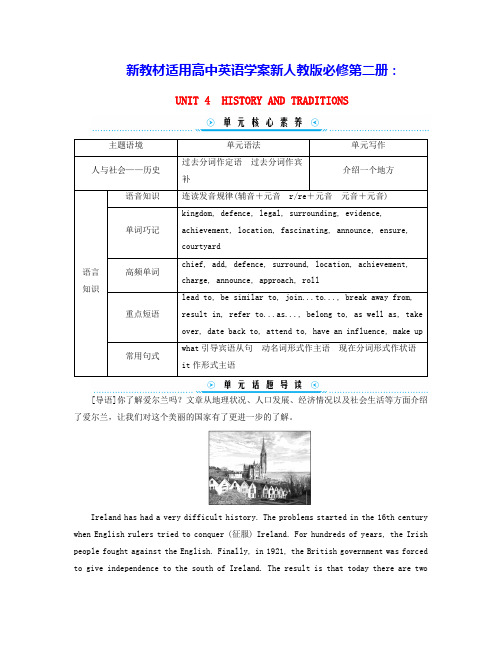
新教材适用高中英语学案新人教版必修第二册:UNIT 4 HISTORY AND TRADITIONS主题语境单元语法单元写作人与社会——历史过去分词作定语过去分词作宾补介绍一个地方语言知识语音知识连读发音规律(辅音+元音r/re+元音元音+元音)单词巧记kingdom, defence, legal, surrounding, evidence,achievement, location, fascinating, announce, ensure,courtyard高频单词chief, add, defence, surround, location, achievement,charge, announce, approach, roll重点短语lead to, be similar to, join...to..., break away from,result in, refer to...as..., belong to, as well as, takeover, date back to, attend to, have an influence, make up 常用句式what引导宾语从句动名词形式作主语现在分词形式作状语it作形式主语[导语]你了解爱尔兰吗?文章从地理状况、人口发展、经济情况以及社会生活等方面介绍了爱尔兰,让我们对这个美丽的国家有了更进一步的了解。
Ireland has had a very difficult history. The problems started in the 16th century when English rulers tried to conquer (征服) Ireland. For hundreds of years, the Irish people fought against the English. Finally, in 1921, the British government was forced to give independence to the south of Ireland. The result is that today there are two“Irelands”. Northern Ireland, in t he north, is part of the United Kingdom. The Republic of Ireland, in the south, is an independent country.In the 1840s the main crop,potatoes, was affected by disease and about 750,000 people died of hunger. This, and a shortage (短缺) of work, forced many people to leave Ireland and live in the USA, the UK, Australia and Canada. As a result of these problems, the population fell from 8.2 million in 1841 to 6.6 million in 1851.For many years, the majority of Irish people earned their living as farmers. Today, many people still work on the land but more and more people are moving to the cities to work in factories and offices. Life in the cities is very different from life in the countryside, where things move at a quieter and slower pace.The Irish are famous for being warm-hearted and friendly. Oscar Wilde, a famous Irish writer, once said that the Irish were “the greatest talkers since the Greeks”. Since independence, Ireland has revived (复兴) its own culture of music, language, literature and singing. Different areas have different styles of old Irish songs which are sung without instruments. Other kinds of Irish music use many different instruments such as the violin, whistles, etc.1.What does the author tell us in Paragraph 1? DA.How the Irish fought against the English.B.How Ireland gained independence.C.How English rulers tried to conquer Ireland.D.How two “Irelands” came into being.解析:主旨大意题。
新人教高一英语必修第二册Unit 4 Listening and Speaking教案
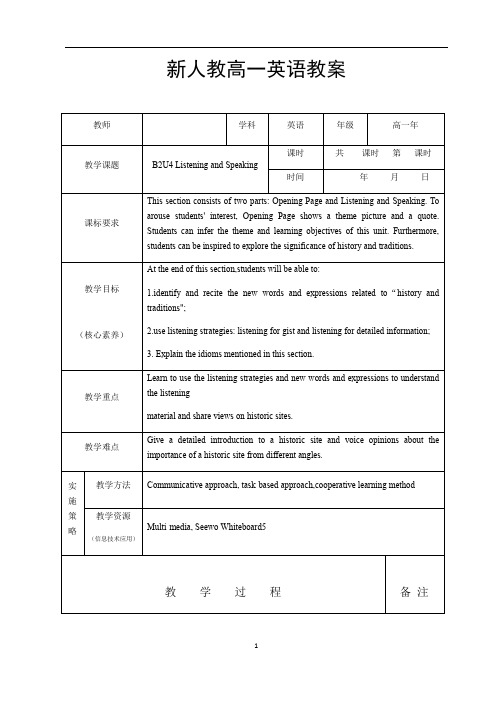
教学重点
Learn to use the listening strategies and new words and expressions to understand the listening
material and share views on historic sites.
·Invite a few students to report their answers.
·Present the listening texts and ask students to find and read the speakers' views on historic sites.
Step 4 Understanding idioms
2. Listening for important information
·Ask students to listen to the conversation again and finish Activity 2.Focus on the facts or the speakers' opinions about Confucius.
Step 3 Practice listening
1. Listening for gist
·Ask students to listen to the conversation and choose the points mentioned in the conversation.
(Options:
教学资源
(信息技术应用)
Multi-media, Seewo Whiteboard5
人教版高中英语必修二unit4学习教案

人教版高中英语必修二unit4学习教案一、教学内容二、教学目标1. 学生能够理解并掌握阅读材料中的生词和短语,如:oxygen, generate, climax等。
2. 学生能够运用一般现在时和一般过去时描述云的形成过程及特点。
3. 学生能够运用所学知识,进行有关天气和自然现象的讨论。
三、教学难点与重点1. 教学难点:一般现在时和一般过去时的运用,以及使用“It”作为形式主语的句子结构。
2. 教学重点:云的形成过程、特点以及与之相关的词汇和表达。
四、教具与学具准备1. 教师准备:PPT、黑板、粉笔、阅读材料。
2. 学生准备:课本、笔记本、字典。
五、教学过程1. 导入:通过展示一组有关天气和云的照片,引导学生讨论天气和云的特点。
2. 阅读与思考:学生阅读“A Day in the Clouds”一文,并完成相关练习,教师进行讲解。
3. 例题讲解:讲解一般现在时和一般过去时的运用,以及使用“It”作为形式主语的句子结构。
4. 随堂练习:学生完成Discovering Useful Structures部分的相关练习,教师进行点评。
5. 小组讨论:学生分组讨论,运用所学知识描述云的形成过程及特点。
六、板书设计1. Unit 4 A Day in the Clouds2. 词汇:oxygen, generate, climax等3. 句子结构:一般现在时、一般过去时,使用“It”作为形式主语七、作业设计1. 作业题目:根据课堂所学,写一篇关于云的形成过程及特点的短文。
2. 答案要求:使用一般现在时和一般过去时,不少于100词。
八、课后反思及拓展延伸1. 教师反思:关注学生在课堂上的参与程度,调整教学方法和节奏,以提高教学效果。
2. 拓展延伸:鼓励学生关注天气变化,观察云的形态,提高英语实际应用能力。
重点和难点解析1. 教学难点:一般现在时和一般过去时的运用,以及使用“It”作为形式主语的句子结构。
2. 例题讲解:讲解一般现在时和一般过去时的运用,以及使用“It”作为形式主语的句子结构。
新人教高一英语必修第二册Unit4 Discovering useful structures教案
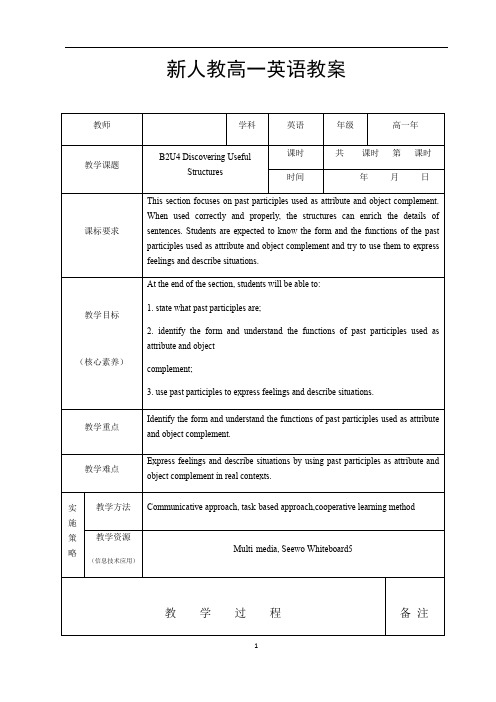
3. use past participles to express feelings and describe situations.
教学重点
Identify the form and understandቤተ መጻሕፍቲ ባይዱthe functions of past participles used as attribute and object complement.
教学资源
(信息技术应用)
Multi-media, Seewo Whiteboard5
教 学 过 程
备注
Step 1 Defining past participles
·Show the two example sentences:
1)He is a man who is loved and respected by all.
·Show three types of non-finite verbs: to do,the -ing form and the -ed form.
·Make students focus on the grammatical term of -ed form- past participles.
·Ask students to link all the sentences into a story.
Step 4 Discovering the use of past participles as attribute
1. Discovering the structures
·Ask students to use the past participles in the left column to complete the phrases in the right column in Activity 2.
高中英语必修二人教版导学案:Unit 4 4课时 Word版缺答案
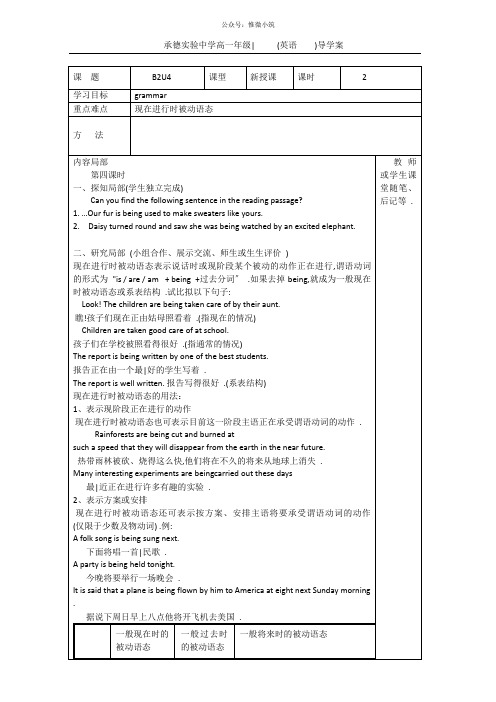
/were written
will be written
has
/have been written
is/are being written
三、应用局部(学生独立或小组合作完成、展示、评价)
Complete the sentences
____________________________ (应该注意)even the smallest detail.
2. Daisy turned round and saw she was being watched by an excited elephant.
二、研究局部(小组合作、展示交流、师生或生生评价)
现在进行时被动语态表示说话时或现阶段某个被动的动作正在进行,谓语动词的形式为"is / are / am + being +过去分词〞.如果去掉being,就成为一般现在时被动语态或系表结构.试比拟以下句子:
报告正在由一个最|好的学生写着.
The report is well written.报告写得很好.(系表结构)
现在进行时被动语态的用法:
1、表示现阶段正在进行的动作
现在进行时被动语态也可表示目前这一阶段主语正在承受谓语动词的动作.
Rainforests are being cut and burned at such a speed that they will disappear from the earth in the near future.
承德实验中学高一年级|(英语)导学案
课题
B2U4
课型
新授课
课时
2
学习目标
grammar
重点难点
现在进行时被动语态
2019-2020学年英语高中人教版必修2学案:4.4 Word版含解析】
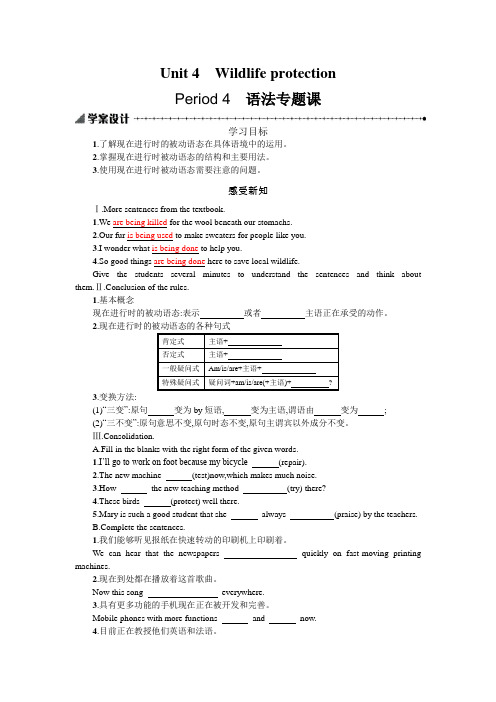
Unit 4Wildlife protectionPeriod 4语法专题课学习目标1.了解现在进行时的被动语态在具体语境中的运用。
2.掌握现在进行时被动语态的结构和主要用法。
3.使用现在进行时被动语态需要注意的问题。
感受新知Ⅰ.More sentences from the textbook.1.We are being killed for the wool beneath our stomachs.2.Our fur is being used to make sweaters for people like you.3.I wonder what is being done to help you.4.So good things are being done here to save local wildlife.Give the students several minutes to understand the sentences and think about them.Ⅱ.Conclusion of the rules.1.基本概念现在进行时的被动语态:表示或者主语正在承受的动作。
2.3.变换方法:(1)“三变”:原句变为by短语,变为主语,谓语由变为;(2)“三不变”:原句意思不变,原句时态不变,原句主谓宾以外成分不变。
Ⅲ.Consolidation.A.Fill in the blanks with the right form of the given words.1.I’ll go to work on foot because my bicycle (repair).2.The new machine (test)now,which makes much noise.3.How the new teaching method (try) there?4.These birds (protect) well there.5.Mary is such a good student that she always (praise) by the teachers.plete the sentences.1.我们能够听见报纸在快速转动的印刷机上印刷着。
高中英语必修第二册 UNIT 4 Section Ⅱ
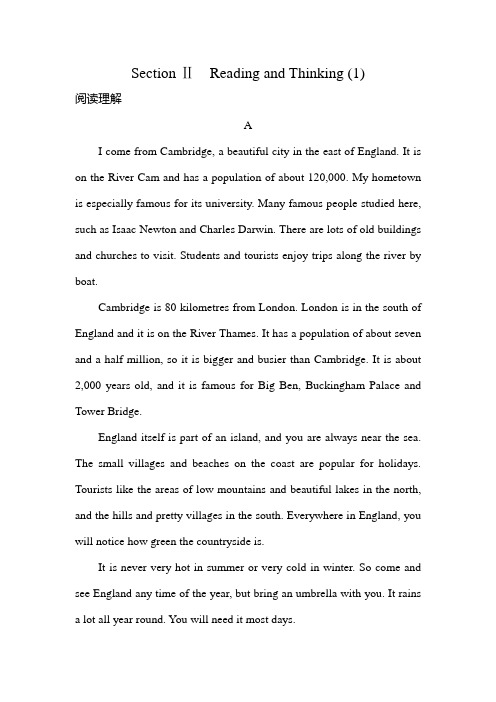
Section ⅡReading and Thinking (1)阅读理解AI come from Cambridge, a beautiful city in the east of England. It is on the River Cam and has a population of about 120,000. My hometown is especially famous for its university. Many famous people studied here, such as Isaac Newton and Charles Darwin. There are lots of old buildings and churches to visit. Students and tourists enjoy trips along the river by boat.Cambridge is 80 kilometres from London. London is in the south of England and it is on the River Thames. It has a population of about seven and a half million, so it is bigger and busier than Cambridge. It is about 2,000 years old, and it is famous for Big Ben, Buckingham Palace and Tower Bridge.England itself is part of an island, and you are always near the sea. The small villages and beaches on the coast are popular for holidays. Tourists like the areas of low mountains and beautiful lakes in the north, and the hills and pretty villages in the south. Everywhere in England, you will notice how green the countryside is.It is never very hot in summer or very cold in winter. So come and see England any time of the year, but bring an umbrella with you. It rains a lot all year round. You will need it most days.1. How many examples of famous people are mentioned in the passage?A. One.B. Two.C. Three.D. Four.解析:细节理解题。
- 1、下载文档前请自行甄别文档内容的完整性,平台不提供额外的编辑、内容补充、找答案等附加服务。
- 2、"仅部分预览"的文档,不可在线预览部分如存在完整性等问题,可反馈申请退款(可完整预览的文档不适用该条件!)。
- 3、如文档侵犯您的权益,请联系客服反馈,我们会尽快为您处理(人工客服工作时间:9:00-18:30)。
新教科版高中英语必修二学案
UNIT 4 WHAT'S IN
【学习目标】
语言目标:
1.需要掌握的词汇和短语:jeans, youth, adventure, wonder, brand, trendy, fashion, rebellion, mainstream, troops, symbol, attention, design, style, energy, nobility, likely, proper, formal, wedding, funeral.
2.学习使用本课重点句型:I have got … And you?/ It is believed that …/ It is quite possible that …/ He is likely to quickly forget his sad experience in this city.
能力目标:
能够应用所学句型表达与主题相关的话题。
情感目标:
了解价值观,世界观,人生观。
【学习重难点】
1.掌握词汇和短语:jeans, youth, adventure, wonder, brand, trendy, fashion, rebellion, mainstream, troops, symbol, attention, design, style, energy, nobility, likely, proper, formal, wedding, funeral.
2.掌握重点句型:I have got … And you?/It is believed that …/It is quite possible that …/He is likely to quickly forget his sad experience in this city.
3.学会如何运用情态动词。
4.在情境中运用所学知识:表达情态动词。
【学习过程】
一、新知学习
1.课文预习。
阅读课文,将自己不认识的单词与句子写下来。
__________________________________________________________________
__________________________________________________________________
__________________________________________________________________。
